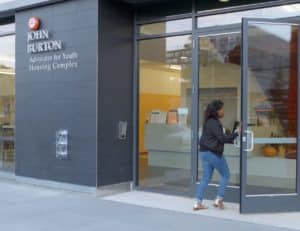
‘Aging out’ of foster care is a challenge under the best of circumstances.
Now add in the impacts of a global pandemic and devastated economy. It would be hard to imagine a more difficult time to be young—and without the support of an extended family.
Fortunately, 24 former foster youth in San Francisco have a shelter in the storm. They live in the John Burton Advocates for Youth Housing Complex.
Completed in 2018, the John Burton Advocates for Youth Housing Complex has 50 units of service-enriched affordable housing, including 24 homes for TAY—youth between the ages of 16 to 24 who are transitioning out of foster care. It is located in the Fillmore District of San Francisco and is part of the Booker T. Washington Community Service Center’s 70,000 square foot mixed-use facility, which is celebrating its 100th anniversary this year.
John Burton Advocates for Youth provided the development with critically needed financial support to help complete construction. The complex also includes a childcare facility, youth programming space, recording studios, a gym, and community space. It supports its tenants and neighbors with recreation activities, educational support and vocational training, and senior clubs, as well as focusing on the guidance and development of its youth and young adults.
Marquis Engle is the Director of Programming for Teens and Transition Age Youth and has seen first-hand how youth in the housing program have been negatively impacted by the pandemic.
“COVID-19 and the recession caused a lot of challenges for all of us, but especially for former foster youth,” said Marquis. “Many have lost their jobs.”
To ensure young people stay on track, youth who live in the John Burton Advocates for Youth Housing Complex have access to a range of supports. This includes community-building events, such as vegan cooking and martial arts, as well as employment programs, such as an eight-week employment training program, where youth are paired with a technology company. Youth also receive one-on-one case management provided by First Place for Youth.
But the programs aren’t all work. Despite the unprecedented challenges of 2020, the Center is still drawing on the principles that have animated it since 1920. “A big goal of our programs is to deepen the relationships with the young people,” said Marquis. “We talk. We sing. We enjoy ourselves!”
